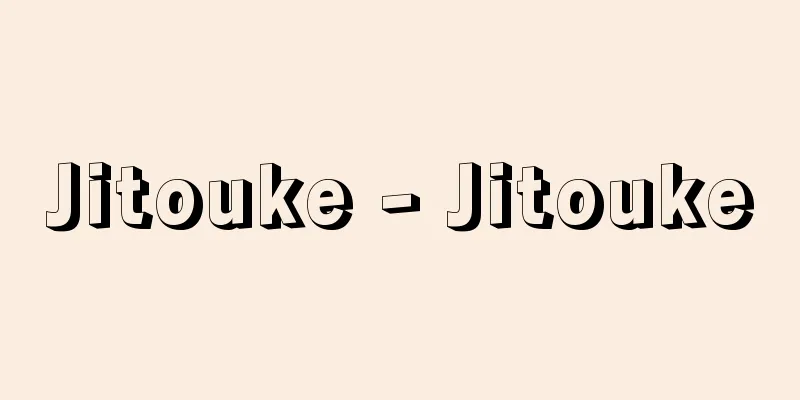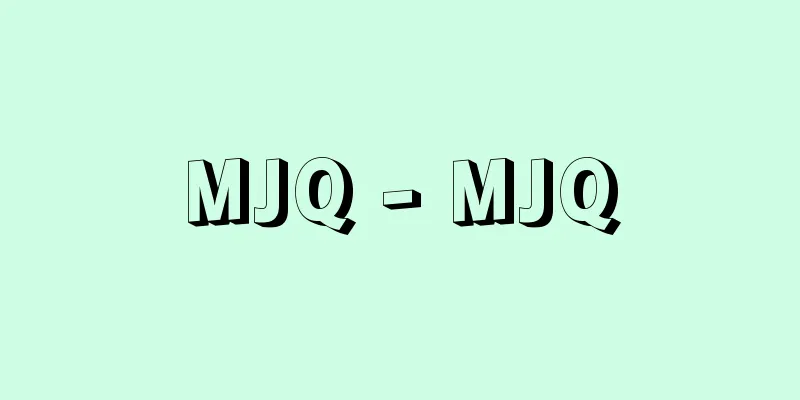Jitouke - Jitouke

|
This is a method whereby the lord of a manor entrusts the management of the manor entirely to the land steward, in exchange for the land steward paying a fixed amount of annual tax regardless of the year's harvest. It is also called "Jito Ukesho." This fixed amount of annual tax is called Ukeryo. This phenomenon can be seen from the early Kamakura period, but it generally came into existence from the mid- to late Kamakura period. The land stewards established by the Kamakura Shogunate abused their authority and often illegally withheld the annual tax that should have been paid to the manor lord. The ostensible reason for the withholding of annual tax was a decrease in revenue due to natural disasters such as water damage, wind damage, and drought damage, but the manor lord would get into a dispute with the Jito each time and try to settle the matter by suing the Shogunate. So Jito Uke was one of the methods taken to avoid the hassle of settling these disputes. There were two types of Jitouke: those established when the manor lord and the Jito made a direct private contract, and those established through the Shogunate's entrance into the land. The latter was established when the Shogunate requested the manor lord to make the Jitouke a Jito as a preferential treatment for the Jito. This type of Jitouke was not only used in manors, but also in Kokuga lands. This allowed the Jito to legally seize de facto control over their territories, and they were able to freely impose various public duties (miscellaneous taxes), strengthening their control over their territories. Furthermore, there were many cases of overdue or unpaid contract fees, and as a result of Jitouke, the Jito became increasingly like feudal lords. [Motohisa Yasuda] Source: Shogakukan Encyclopedia Nipponica About Encyclopedia Nipponica Information | Legend |
|
荘園(しょうえん)領主が地頭に荘園管理を全面的にゆだねるかわりに、毎年の豊凶にかかわらず一定の年貢の進納を請け負わせる方法のこと。「地頭請所(うけしょ)」ともいう。この一定額の年貢を請料(うけりょう)という。鎌倉初期からみられる現象であるが、一般的な成立は鎌倉中期から後期にかけてである。鎌倉幕府設置の地頭は、その権限を乱用、荘園領主に進納すべき年貢を不法抑留することが多くなった。その年貢抑留の表面上の理由は、水損、風損、干損などの天災による収益の減少であるが、荘園領主はそのたびに地頭と紛争を起こし、幕府への訴訟によって解決を図った。そこでこの紛争解決の煩わしさから免れるためにとられた方法の一つが、この地頭請である。地頭請には、荘園領主と地頭とが直接に私的契約を結んで成立する請所と、幕府口入(くにゅう)の請所があった。後者は、幕府が地頭優遇策として、荘園領主側に請所とすることを要求して成立したもの。このような地頭請は、荘園に限らず国衙(こくが)領でも行われた。このことにより地頭は在地における事実上の支配権を合法的に掌握し、種々の公事(くじ)課役(雑税)を自由に賦課して在地への支配を強化していった。さらに、契約している請料の滞納・未済なども多く、地頭請の結果、地頭の封建領主化が進んだ。 [安田元久] 出典 小学館 日本大百科全書(ニッポニカ)日本大百科全書(ニッポニカ)について 情報 | 凡例 |
Recommend
dialektiketechne (English spelling)
…Dialectics is originally a word that means the a...
Aigun
…An old county in the northern part of Heilongjia...
Ookido - Ookido
This is a former place name located near the Yots...
Parmenion (English spelling)
[Born] Around 400 B.C. [Died] 330 BC. Ecbatana. An...
Johannes von Tepl
1350?-1414 A Bohemian (Czech) author of the late M...
Gilchrist, PC (English spelling) GilchristPC
…He focused on research into dephosphorization, w...
Azumie - Abokukou
...means "black river" in Vietnamese. I...
Giant water bug - Giant water bug
...They hatch in about a month, after which the e...
Taklamakan Desert - Taklamakan Desert
China's largest desert, covering the center of...
Rienzi (English spelling)
…In the same year, he married the actress Minna P...
's-Gravenhage (English spelling) sGravenhage
...Population: 456,886 (1980). Commonly known as ...
Thin swallowtail moth - Thin swallowtail moth
…The bamboo grass moth Balataea funeralis is not ...
Maltese cross
...The flowers are about 3cm in diameter and redd...
Rational Expectations and the Theory of Price Movements
...In contrast to the equilibrium state under suc...
Tenjinmae ruins - Tenjinmae ruins
The remains of a reburial tomb from the middle Yay...



![Jozankei [Hot Springs] - Jozankei](/upload/images/67cbdcd3548ba.webp)

![Aretas [IV] - Aretas](/upload/images/67cf4a0be0e44.webp)



